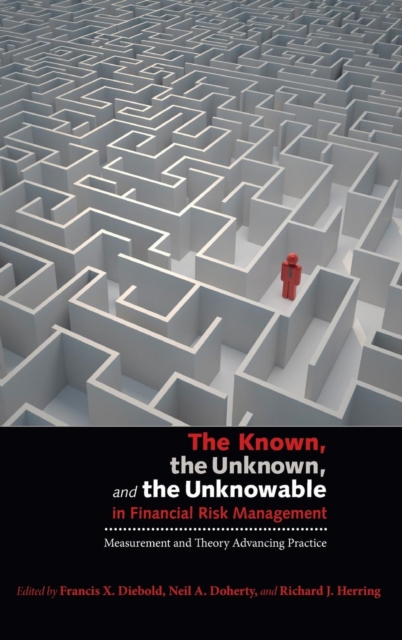
The Known, the Unknown, and the Unknowable in Financial Risk Management : Measurement and Theory Advancing Practice Hardback
Edited by Francis X. Diebold, Neil A. Doherty, Richard J. Herring
Hardback
Description
A clear understanding of what we know, don't know, and can't know should guide any reasonable approach to managing financial risk, yet the most widely used measure in finance today--Value at Risk, or VaR--reduces these risks to a single number, creating a false sense of security among risk managers, executives, and regulators.
This book introduces a more realistic and holistic framework called KuU --the K nown, the u nknown, and the U nknowable--that enables one to conceptualize the different kinds of financial risks and design effective strategies for managing them.
Bringing together contributions by leaders in finance and economics, this book pushes toward robustifying policies, portfolios, contracts, and organizations to a wide variety of KuU risks.
Along the way, the strengths and limitations of "quantitative" risk management are revealed.
In addition to the editors, the contributors are Ashok Bardhan, Dan Borge, Charles N.
Bralver, Riccardo Colacito, Robert H. Edelstein, Robert F. Engle, Charles A. E. Goodhart, Clive W. J. Granger, Paul R. Kleindorfer, Donald L. Kohn, Howard Kunreuther, Andrew Kuritzkes, Robert H.
Litzenberger, Benoit B. Mandelbrot, David M. Modest, Alex Muermann, Mark V. Pauly, Til Schuermann, Kenneth E. Scott, Nassim Nicholas Taleb, and Richard J. Zeckhauser. * Introduces a new risk-management paradigm * Features contributions by leaders in finance and economics * Demonstrates how "killer risks" are often more economic than statistical, and crucially linked to incentives * Shows how to invest and design policies amid financial uncertainty
Information
-
Available to Order - This title is available to order, with delivery expected within 2 weeks
- Format:Hardback
- Pages:392 pages, 4 halftones. 31 line illus. 23 tables.
- Publisher:Princeton University Press
- Publication Date:09/05/2010
- Category:
- ISBN:9780691128832
Information
-
Available to Order - This title is available to order, with delivery expected within 2 weeks
- Format:Hardback
- Pages:392 pages, 4 halftones. 31 line illus. 23 tables.
- Publisher:Princeton University Press
- Publication Date:09/05/2010
- Category:
- ISBN:9780691128832






